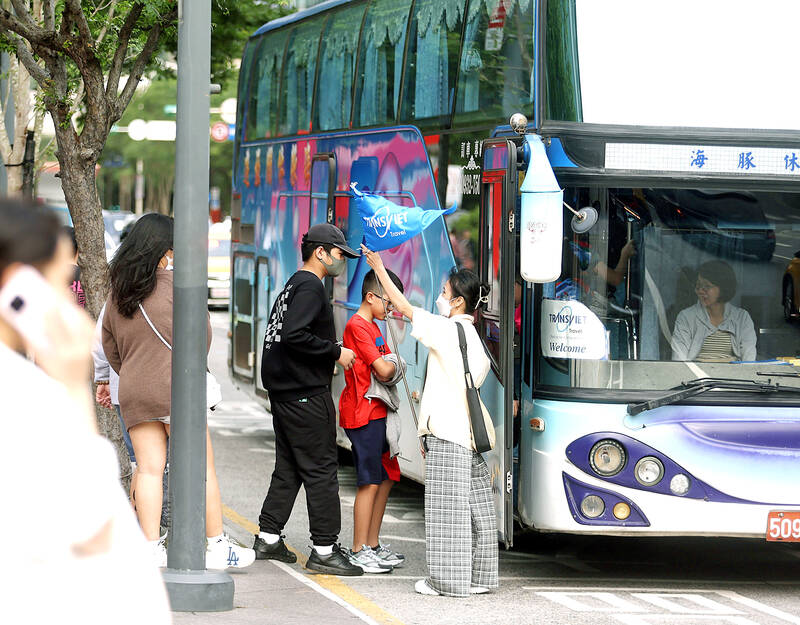Manufacturers and travel agencies placed more of their workers on unpaid leave programs over the past week, pushing the total number of furloughed workers to nearly 16,000, the Ministry of Labor said yesterday.
The number of workers on unpaid leave programs registered with the government rose to 15,809 as of Sunday, up 861 from 14,948 from April 23, while the number of employers with such programs grew to 2,154, up 110 from a week earlier, the ministry said.
Department of Labor Standards and Equal Employment Director Huang Wei-chen (黃維琛) said the manufacturing sector and the support services sector, which mostly consists of travel agencies, were the two main contributors to the increase in furloughed workers last week.

Photo: CNA
The export-oriented manufacturing sector continued to be affected by weakening global demand, and reported 7,207 furloughed workers as of Sunday, up 271 from a week earlier, Huang said.
The total was the most of any sector and accounted for 46 percent of all workers on official unpaid leave programs.
A total of 335 manufacturers had instituted furlough programs as of Sunday, including two companies based in the Hsinchu Science Park (新竹科學園區) — which houses many tech giants — largely due to a decline in export orders, Huang said.
That number was up 11 from 324 as of April 23, ministry data showed.
Among the additional companies, an electronics component maker initiated an unpaid leave program involving about 160 workers, citing an unsteady supply of raw materials, Huang said.
The number of furloughed workers in the support services sector was 5,343 as of Sunday, the second highest among all sectors, ministry data showed.
In the past week, the number of workers placed on unpaid leave programs by local travel agencies rose more than 300, while the number of employers implementing such programs also increased 53 to 1,069, the ministry said.
As Taiwan has eased most of its COVID-19 border controls, the support services sector has shown signs of improving, and travel agencies with unpaid leave programs would likely use more workers in the coming months, Huang said.
In the past week, the number of furloughed workers in the retail and wholesale industry rose to 1,276 from 1,184, while in the lodging, and food and beverage sectors, the figure rose to 646 from 603, the ministry said.

The US dollar was trading at NT$29.7 at 10am today on the Taipei Foreign Exchange, as the New Taiwan dollar gained NT$1.364 from the previous close last week. The NT dollar continued to rise today, after surging 3.07 percent on Friday. After opening at NT$30.91, the NT dollar gained more than NT$1 in just 15 minutes, briefly passing the NT$30 mark. Before the US Department of the Treasury's semi-annual currency report came out, expectations that the NT dollar would keep rising were already building. The NT dollar on Friday closed at NT$31.064, up by NT$0.953 — a 3.07 percent single-day gain. Today,

‘SHORT TERM’: The local currency would likely remain strong in the near term, driven by anticipated US trade pressure, capital inflows and expectations of a US Fed rate cut The US dollar is expected to fall below NT$30 in the near term, as traders anticipate increased pressure from Washington for Taiwan to allow the New Taiwan dollar to appreciate, Cathay United Bank (國泰世華銀行) chief economist Lin Chi-chao (林啟超) said. Following a sharp drop in the greenback against the NT dollar on Friday, Lin told the Central News Agency that the local currency is likely to remain strong in the short term, driven in part by market psychology surrounding anticipated US policy pressure. On Friday, the US dollar fell NT$0.953, or 3.07 percent, closing at NT$31.064 — its lowest level since Jan.

Hong Kong authorities ramped up sales of the local dollar as the greenback’s slide threatened the foreign-exchange peg. The Hong Kong Monetary Authority (HKMA) sold a record HK$60.5 billion (US$7.8 billion) of the city’s currency, according to an alert sent on its Bloomberg page yesterday in Asia, after it tested the upper end of its trading band. That added to the HK$56.1 billion of sales versus the greenback since Friday. The rapid intervention signals efforts from the city’s authorities to limit the local currency’s moves within its HK$7.75 to HK$7.85 per US dollar trading band. Heavy sales of the local dollar by

The Financial Supervisory Commission (FSC) yesterday met with some of the nation’s largest insurance companies as a skyrocketing New Taiwan dollar piles pressure on their hundreds of billions of dollars in US bond investments. The commission has asked some life insurance firms, among the biggest Asian holders of US debt, to discuss how the rapidly strengthening NT dollar has impacted their operations, people familiar with the matter said. The meeting took place as the NT dollar jumped as much as 5 percent yesterday, its biggest intraday gain in more than three decades. The local currency surged as exporters rushed to